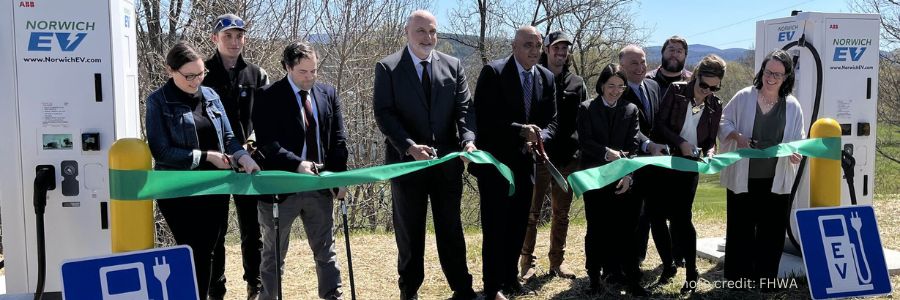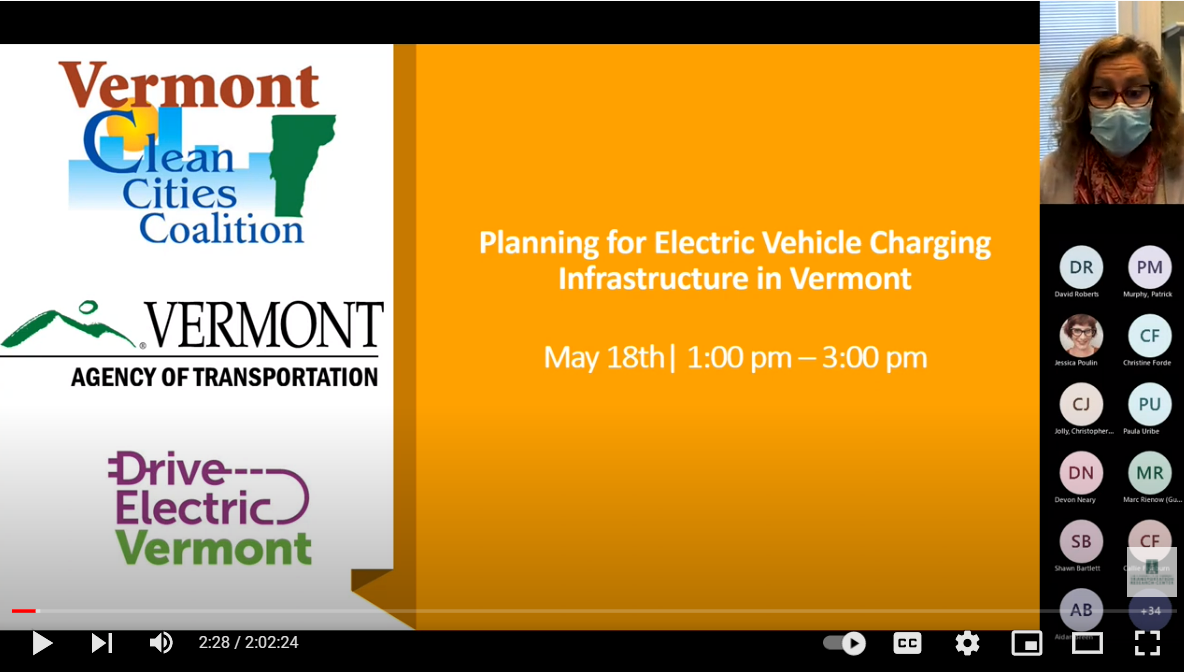Summary of Program
The Infrastructure Investment and Jobs Act, signed into law on November 15, 2021, established the National Electric Vehicle Infrastructure (NEVI) Formula Program to provide dedicated funding to states to deploy electric vehicle charging infrastructure along key interstate and state highway corridors. The goal of the Program is to create a reliable, convenient network of fast EV charging stations for drivers nationwide in order to help speed the adoption of electric vehicles and increase equitable access to infrastructure and economic opportunity.
For federal fiscal years 2022-2026, Vermont will receive $21.2 million, with the Federal Highway Administration already apportioning $3.1 million for FY2022, $4.5 million for FY2023, $4.5 million for FY2024, and $4.5 million for FY2025. The funding comes with a federal share of 80% and match requirement of 20%, which can be met with the private investment of third-party contractors.
The Federal Highway Administration (FHWA) issued program guidelines, which establish minimum standards for the buildout of designated Alternative Fuel Corridors, as well as the processes for nominating new corridors and developing the required state deployment plan. Some highlights include:
- EV charging stations must be located within one (1) mile of an interstate exit or highway intersection, and within fifty (50) miles of the next charging location
- A minimum of four (4) CCS ports capable of charging at 150kW simultaneously must be installed at each location (600kW minimum per location)
- A state deployment plan must be submitted annually with all the required elements to FHWA and approved in order for the state to access the NEVI funds
Vermont’s Plan
Vermont has been a leader in public EV charging deployment, with more chargers per capita than any state in the nation. In the fall of 2021, the Vermont Agency of Transportation sought to build upon the state’s early success by working with Drive Electric Vermont to develop a ten-year, statewide strategic Electric Vehicle Supply Equipment (EVSE) deployment plan. This initial effort formed the foundation of the required NEVI plan, which is updated annually to reflect sustained public engagement, lessons learned from implementation, and revised projections. The initial state plan and subsequent FHWA-approved plans are posted below for reference.
- Vermont 2024 State NEVI Plan Update, Approved by FHWA on November 15, 2024
- Vermont 2023 State NEVI Plan Update, Approved by FHWA on September 29, 2023
- Vermont 2022 State NEVI Plan, Approved by FHWA on September 27, 2022
Public Engagement
The Vermont Agency of Transportation recognizes that the program funding is highly prescribed in the first few years until the State of Vermont has met its requirements to have its alternative fuel corridors certified as “built-out.” Nevertheless, the Agency has sought and continues to seek public and stakeholder input through multiple meetings and a variety of means, including future plans to deepen engagement with rural, disadvantaged and underserved communities.
On May 18, 2022, the Agency, along with Vermont Clean Cities Coalition and Drive Electric Vermont, jointly hosted a virtual public forum as part of the statewide EV charging infrastructure planning process. The forum opened with an overview of charging infrastructure, Vermont’s charging investments to date, and federal and state goals for EV charging. The group then shared funding opportunities available to expand charging availability in Vermont and the components in Vermont’s EV charging plan under development. Attendees broke out into smaller groups to provide feedback, share their thoughts, and ask questions.
EVSE Survey
To identify potential site host locations for charging stations, the State and Drive Electric Vermont released a survey targeted to property and business owners interested in supporting plug-in electric vehicle (PEV) charging or providing services associated with the installation and management of charging.
Those interested in partnering with the State may fill out the survey to offer their collaboration. Survey responses will help identify opportunities for potential charging locations or EV charging services. Survey responses are shared to facilitate potential partnering discussions between property owners/managers, charging service providers, and installation contractors.
Contracting
To create an efficient, effective, and fair contracting process for NEVI-funded projects, and future charging installations regardless of funding source, the Agency developed a process to solicit competitive bids that advance plan objectives.
EVSE projects do not fit neatly into traditional design-build contracts as the NEVI program requires an ongoing relationship with maintenance, uptime, reporting, and other requirements that must extend for at least five years beyond the construction itself. To navigate this new contracting territory, the Agency worked with FHWA to develop a contract for services model that blends the two, with the idea that the contracts will be performance-based, reimbursements made upon meeting certain milestones/deliverables, including annual submissions attesting to program compliance.
After opening one of the first NEVI-funded charging locations in the country, the Agency released a Request for Qualifications to develop a list of qualified EV charging providers that can perform nearly all aspects of the NEVI program from working with site hosts on agreements, designing and installing NEVI-compliant equipment, to operating and maintaining the equipment to meet accessibility, uptime, reporting and other requirements. Multiple RFPs may now be issued to this list using multiple sources of funding over time.
The Agency will also contract with third party vendors to verify the delivery of EV charging infrastructure at the locations proposed in the plan and at new sites identified throughout the duration of the program according to all state and federal requirements. To ensure EVSE projects meet program requirements, the Agency's contract for services model will pass through all the provisions to which these projects will be subject.
The following summarizes the contracting process to date:
- On April 16, 2024, AOT issued a Request for Qualifications (RFQ) to identify electric vehicle charging providers that are capable of building out Vermont's charging network to federal and state specifications. For the full announcement, please read the press release.
- On June 5, 2024, AOT announced the list of electric vehicle charging providers selected through the RFQ process to build out Vermont’s charging network to federal and state specifications. For the full announcement, please read the press release.
- On July 25, 2024, AOT issued a Request for Proposals (RFP) to invite bids from the eight providers selected through the RFQ for the design, construction, ownership, operation, and maintenance of public charging infrastructure at 14 sites along Vermont's Alternative Fuel Corridors.
- On December 12, 2024, AOT announced the award of 11 electric vehicle (EV) public charging projects that will contribute toward the build out of Vermont’s charging network to federal and state specifications with the installation of 60 additional fast charging ports across the state. For the full announcement, please read the press release.
- A second solicitation is expected to be issued in the near future for proposals to complete contracting for “fully built-out” status and to begin to fill in gaps both on and off designated corridors. That announcement will be posted here and on the Contract Administration website when it becomes available.
Resources
- NEVI Guidance
- Alternative Fuel Corridors
- EV Charging in Vermont (Drive Electric Vermont)
- Environmental Justice Mapping Tool
- Rural EV Toolkit
For those interested in viewing the Geographic Information System (GIS) data used in Vermont's NEVI Plan, the files may be downloaded using the links below. There are two versions: a ZIP file containing all the necessary files to use in the GIS shapefile format, and an ESRI layer package file version for ArcGIS users.
- VT_NEVI_2023_Charging_Priority_Areas_Shapefile.zip
- VT_NEVI_2023_Charging_Priority_Areas_ESRI_Layer_Package
This data is also available through the VT Open Geodata Portal.
The points included represent general areas for priority charging locations and do not necessarily represent the actual on-the-ground locations (many of which are yet to be determined). The files also include locations identified in Vermont's Charging and Fueling Infrastructure (CFI) grant program proposal as those are also depicted in the NEVI plan. Metadata is embedded within the files and the attribute table contains five fields of interest:
- Location: Municipality of the priority area for EV charging installation represented by the point
- NEVI_ID_2023: A numeric field containing numbering used the label the points in VTrans' 2023 NEVI plan map.
- LocationType: The type of investment identified for the location, including NEVI Chargehub, NEVI Standard, and CFI Corridor. Refer to the VTrans plan for additional details.
- & 5. Lat Long: The geographic coordinates of the point representing the priority area in decimal degrees.
Agency Contacts
Hilary DelRoss
Sustainability Projects Coordinator
hilary.delross@vermont.gov
Public Input
If you would like to receive updates from the Agency of Transportation about this or other climate programs and initiatives, please subscribe to our newsletter.
If you would like to participate in this effort, provide feedback, or stay informed of any project developments, please enter a brief note in the "Comments" field when you sign up.


